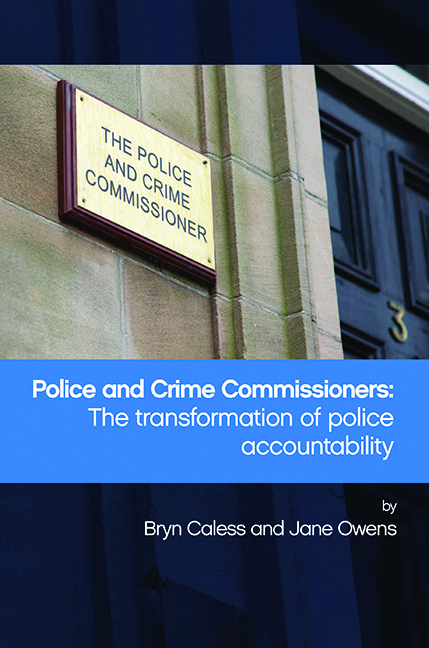Book contents
- Frontmatter
- Dedication
- Contents
- List of tables and figure
- Glossary of terms
- Acknowledgements
- Introduction
- one Governance: the Police and Crime Commissioner and police accountability in context
- two The psephology of the November 2012 election: motive, means and opportunity
- three Is the law on my side? Relationships between the PCC and the chief police officer team
- four Partners, colleagues or rivals for oversight? The (PCC) art of making friends and influencing people
- five “Putting yourself about”: PCCs, the media and the public
- six The debate with no end: PCCs’ remit and the problems of policing
- seven “I wonder if the game is worth the candle”: PCCs, their ‘work–life balance’ and their future
- General summary
- Bibliography
- Appendix Interview questionnaires
- Index
three - Is the law on my side? Relationships between the PCC and the chief police officer team
Published online by Cambridge University Press: 01 September 2022
- Frontmatter
- Dedication
- Contents
- List of tables and figure
- Glossary of terms
- Acknowledgements
- Introduction
- one Governance: the Police and Crime Commissioner and police accountability in context
- two The psephology of the November 2012 election: motive, means and opportunity
- three Is the law on my side? Relationships between the PCC and the chief police officer team
- four Partners, colleagues or rivals for oversight? The (PCC) art of making friends and influencing people
- five “Putting yourself about”: PCCs, the media and the public
- six The debate with no end: PCCs’ remit and the problems of policing
- seven “I wonder if the game is worth the candle”: PCCs, their ‘work–life balance’ and their future
- General summary
- Bibliography
- Appendix Interview questionnaires
- Index
Summary
‘The PCC came into this job on the back of a tiny number of people who voted obediently with their party machine and he has no proper mandate to control the police at all. And we’re stuck with this party hack who now tells us that he is empowered to make changes and that we’d better all look out. He actually said that in our first chiefs’ team meeting. You can imagine what the comments were afterwards.’ (Chief Officer 1)
‘I think that this PCC has made a difference already and working with him is exciting and different. He really does have a finger on the pulse and he is frighteningly intelligent. What I really respond to is that you only have to explain once and he remembers. And once he tasks you he lets you get on with it – unlike most police chiefs I’ve ever known, who normally stand over you breathing heavily and saying that they wouldn't do it like that.’ (Chief Officer 6)
‘Most chief constables in 2012 were rampant egoists or else on some kind of personal power trip which would not acknowledge any mandate of the people to hold them to account unless it was flourished under their noses, because of scandal, error or ineptitude.’ (PCC Interviewee 51)
‘I was pleasantly surprised to find that most of my chief officer team is not at all averse to change; they listen well and they challenge back to me, which is healthy and stimulating.’ (PCC Interviewee 64)
This chapter will explore in some detail the nature of the relationship between the PCCs and the ‘top team’ of chief police officers. The range of opinions is demonstrated graphically by the citations with which we begin this chapter: there is a spectrum of opinion on both sides – Commissioners and Chief Officers – that is worth closer analysis. It would be helpful at the outset to consider the differences, from the police perspective, between the Police and Crime Commissioner and the police authority s/he replaced.
- Type
- Chapter
- Information
- Police and Crime CommissionersThe Transformation of Police Accountability, pp. 65 - 94Publisher: Bristol University PressPrint publication year: 2016

